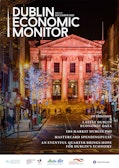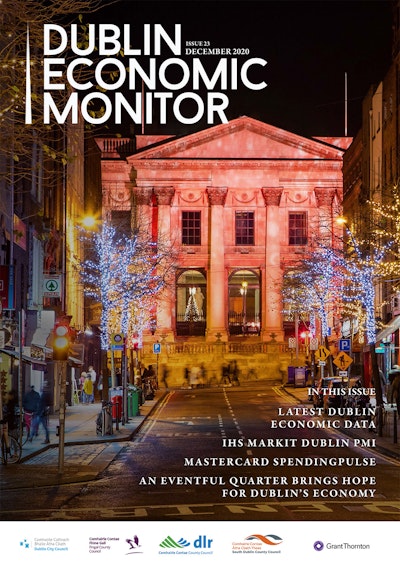The latest Dublin Economic Monitor (DEM), published this morning by the four Dublin Local Authorities, shows that while the Dublin economy continues to be adversely affected by Covid-19, there have been positive developments since the depths of the first national lockdown.
Dublin’s IHS Markit Purchasing Managers’ Index (PMI) recorded a recovery in business activity in Q3 2020, led by expansions in activity in the manufacturing and construction sectors. The PMI recovered to 51.2 in the quarter (where 50 = no change), up from 25.2 in Q2. Services was the sole sector which remained in contraction, while the indices for employment and new orders both remained in negative territory.
On a positive note, retail spending in the Dublin economy rebounded strongly in Q3 2020 but the recovery was uneven. Overall Sales increased by almost 22% QoQ as the easing of Covid-19 restrictions drove improved trading for bricks-and-mortar retailers, while eCommerce expenditure showed a minor 1.2% QoQ decline. Household goods sales rose 62.4% QoQ to exceed pre-pandemic levels, in what was likely a reflection of rising consumer confidence coupled with considerable savings built up earlier in the year.
The labour market suffered further setbacks in Q3 2020, with the unemployment rate in Dublin increasing to 8.2%. When recipients of PUP payments are included, the number of people in the Capital who weren’t working totalled almost 170,000. Specific sectors such as retail and hospitality showed initial signs of recovery in the third quarter, but the imposition of Level 5 restrictions will be expected to have reversed any positive trends. Job opportunities have also been severely affected according to a new dataset from Indeed. Employers have been slow to recruit since the onset of Covid-19 and postings on the Indeed website reached a low in June. Recovery has been slow and postings remained down by close to 40% YoY in November.
The hospitality sector in the Capital has been particularly badly affected by the pandemic and may be one of the last to recover. New data from OpenTable shows that restaurant reservations plummeted in November in line with increased restrictions, having previously recovered to 2019 levels over the summer period. Similarly, hotel occupancy rates have fallen to below 20% as Average Daily Rates remained at exceptionally low levels.
Commenting on the DEM’s findings, Andrew Webb, Chief Economist with Grant Thornton, said:
“The Economic Monitor reflects an eventful quarter which saw strong bounce backs in economic performance quickly run out of steam. This is an unfortunate and inevitable consequence of the ‘stop-go’ cycle that dealing with Covid-19 has pushed us into. New indicators in this edition such as Indeed vacancies and Opentable’s table bookings bring this into sharp focus. Hope for 2021 emerged on the news of a potential vaccine, which, if successful, could see a collective sigh of relief and a strong and sustained bounceback in economic performance next year. Of course, Brexit looms large in the coming weeks and the end of the transition period could lead to an even more complex operating environment in January without a deal.”
The Dublin Economic Monitor is produced by Grant Thornton on behalf of the four Dublin Local Authorities to provide timely, reliable data and commentary on the economic landscape of the Dublin region. It covers 18 key indicators, consumer spending data from the MasterCard SpendingPulse™ and provides regular insights into different aspects of Dublin’s economy.


